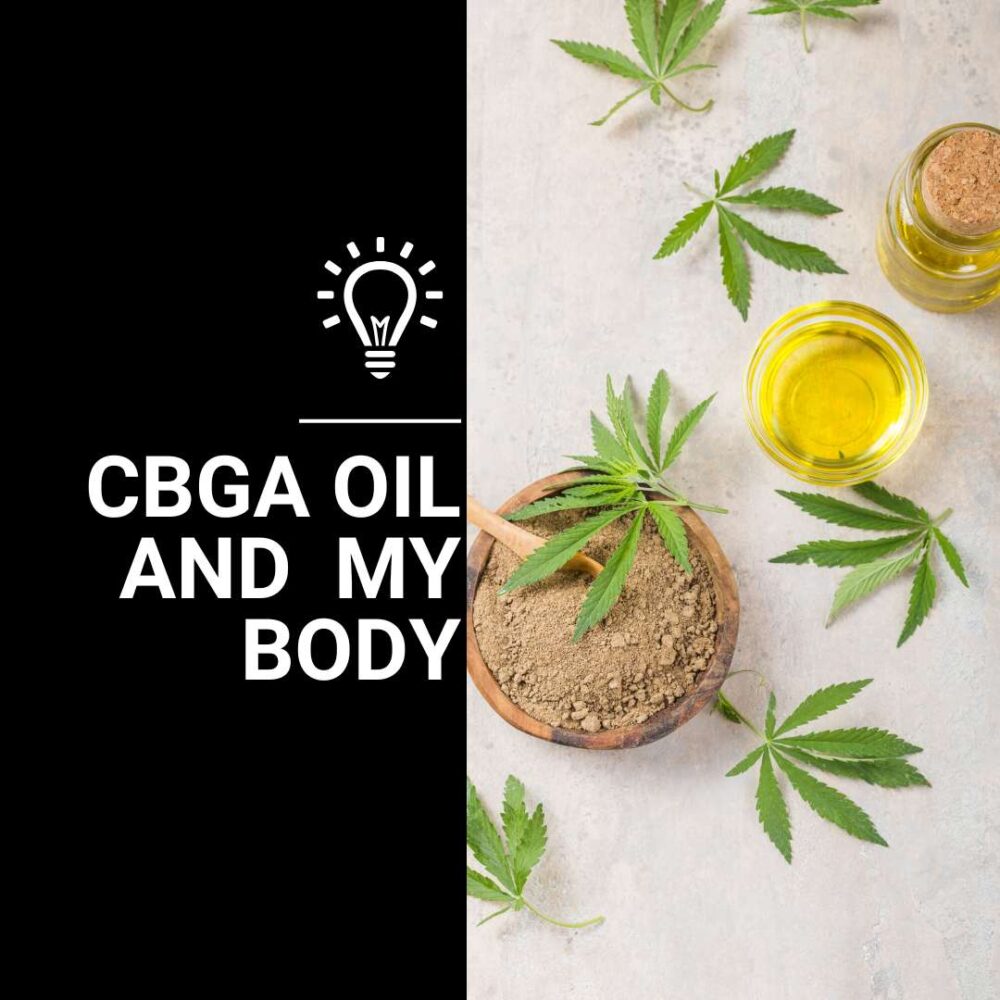
Not sure what hemp oil is best for you?
Maybe you've heard of CBG but not CBGA oil, whats the difference?
What does CBGA oil do?
In this guide, we break down what CBGA oil is, what what the research says about it therapeutic benefits.
Scientists at Natural Dos have unlocked the power of acidic cannabinoids, and now you can get all the benefits of Natural Spectrum CBDA oils that contain CBGA.
Article Highlights
- CBGA oil has over 1000% better absorption than CBG, similar to CBDA vs CBD!
- Research shows CBGA oil has many benefits associated with inflammation and metabolism.
What is CBGA oil
The hemp plant contains over 100 different cannabinoids, and in their natural state are in the acidic form. The most prominent acidic cannabinoid by amount is CBDA (cannabidiolic acid), the precursor to CBD (cannabidiol), but CBGA (cannabigerolic acid) is a close second.
CBGA is the mother compound to all cannabinoids, and is typically only found in full spectrum raw extract. Raw refers to hemp products that have only been extracted and not gone through a purification process that typically involves heat. Additionally, raw form hemp extract usually contains higher amounts of terpenes as well.
Since CBGA is typically only found in small amount in normal hemp plants, breeders have developed strains with higher amounts of CBGA oil. These are typically used to create the tinctures with higher amounts of CBGA compared to the normal high CBDA strains.
Why have you not seen much CBGA oil on the market?
Recently, manufacturers have started creating CBGA products from CBGA isolate, a chemical process where a single cannabinoid is crystallized into a pure powder. While this process is good at isolating compounds, you lose all the other cannabinoids in the process. Thus, they will usually add back other isolates, like CBD, CBDA, or CBG.
What to look for in CBGA oil products
You can determine if your CBGA oil is from isolate by looking at the brand ingredients and it should mention if it is a full spectrum or isolate product.
To make sure the brand is testing its tinctures or edibles, look for a Certificate of Analysis (CoA) that shows the quality of the products. This should be from a certified third party testing laboratory. Check out our cannabinoid CoA guide to understand how to interpret a CoA.
What about organic CBGA oil?
As of 2022, the federal regulations stipulate that you cannot use conventional pesticides for growing hemp. There are many organic pesticides that may be used, but does this mean there are no pesticides in your CBGA oil? Possibly...
If the area that was used to grow the hemp had pesticide use for prior farming, there are pesticides in the soil, and the hemp plant can soak those up. So you still need to testing of the final products to make sure.
Does my CBGA oil contain THC?
While hemp plants legally have to be under 0.3% THC by weight, that does not mean they contain no THC. If the CBGA oil is full spectrum, it may contain small amounts, but not enough to get you high. Check the CoA to see if the CBGA oil contains any THC.
CBGA, like CBDA or CBD, is non psychoactive, and will not get you high or elicit any euphoric feeling.
What are acidic cannabinoids
Acidic cannabinoids are the naturally occurring state of all cannabinoids. The reason you do not typically see them in the store is because conventional purification and extraction technologies used a lot of heat. The heat applied converts CBGA to CBG, or CBDA to CBD in a process termed decarboxylation.
Scientists at Natural Dos have recently developed a new technology to isolate all the acidic cannabinoids from the hemp plant. This technology yields high potency, and high purity naturally occurring CBDA and CBGA in all our products.
What does CBGA and CBG look like?
The difference between CBGA and its decarboxylated form, CBG, are very close. The main difference is a loss of carbon dioxide (CO2), that results from the removal of the carboxylic acid. See figure below for the structure and conversion:

CBGA oil benefits
The acidic cannabinoid class is a relatively new set of compounds that being researched compared to the work on CBD and THC. However, there are a lot of overlaps between CBGA, CBDA, and CBD in how they interact with the endocannabinoid system.
We have highlighted some of the beneficial effects of CBGA oil that the current research has found, and how CBGA and CBDA work with the immune system and provide potential health benefits.
CBGA oil and metabolism
Metabolism of sugar, specifically glucose, is widely studied in diabetes complications. When sugar in the blood is elevated, it creates harmful byproducts, one of them being excess sorbitol. This conversion of glucose to sorbitol is through the aldose reductase enzyme, which has become a target for multiple drugs targeting diabetic complications.
Recently, it was found that both CBDA and CBGA regulates metabolism through the inhibition of aldose reductase. This is opens up new possibilities for acidic cannabinoids to decrease the harmful effects of excess sugar consumption.
CBGA oil enhanced absorption

A recent study into the absorption of CBGA oil and CBG oil was performed by feeding the same amount of cannabinoids to dogs and assessing the blood concentrations. The researchers found enhanced absorption of CBGA oil, over 1000% better than CBG. For reference, the pharmacokinetic AUC (area under the curve) for CBGA oil was 4,436 ng/h/mL compared to CBG at 98 ng/h/mL.
The increase in absorption from CBGA oil is so much better than CBG, that a 50mg dose of CBGA would be approximately the same as a 500mg of CBG. These absorption differences are on par with the difference between CBDA absorption and CBD.
Antioxidant
CBGA antioxidant properties are also being studied, and found that they could act as antioxidants by inhibiting free radical propagation in vitro. These results are still preliminary, are were also found for CBDA, but suggests there may be many mechanisms by which acidic cannabinoids can exert beneficial effects.
CBGA and anticonvulsant properties
Both CBDA and CBGA decreases seizures in a number of mouse models. Controlling seizures is one of the main uses of CBD in FDA approved uses of hemp derived cannabinoid products.
CBGA and inflammation
CBDA and CBGA oil were found to inhibit both COX 1 and COX 2 enzyme activity. The cyclooxygenase class of enzymes are critical for inflammation development, and are classical targets for pain and inflammation drugs such as ibuprofen and aspirin. These studies are opening up the therapeutic potential of acidic cannabinoids, like CBDA and CBGA, for any disease with a significant inflammatory component.
How to take CBDA
For acidic cannabinoids, the best way to take them is through tinctures or edibles. Because CBDA or CBGA is decarboxylated when exposed to heat, using a vape would not work since they would be converted to CBD and CBG.
Check out our CBDA dosage guide to review of how to dose properly. We typically recommend starting with 25-50mg daily. To get the maximum benefit, try a dose every day in your routine.
If you are on multiple medications, we suggest speaking with your health care provider before trying.
FAQ - CBGA oil
CBGA (cannabigerolic acid) is the mother cannabinoid produced in the hemp flower, and is used as the building block for all the downstream cannabinoids like CBDA and THCA. To produce CBGA oil, farmers will identify hemp strains that have high levels of CBGA and lower levels of CBDA and THCA for CBGA oil production.
A typical CBGA oil distillate will have majority CBGA, but also contain a relatively high level of CBDA as well since its difficult to get strains that will not produce CBDA from CBGA.
CBGA (cannabigerolic acic) is the precursor to CBG, and can have up to 40-times greater absorption compared to CBG. CBGA has been tested in pre-clinical trials for its anti cancer, inflammation, and anti-viral properties.
CBGA is not psychoactive, and will not get you high like its cousin delta-9 THC found in marijuana. CBGA is known for it energizing effects, but not so much its calming effects like other cannabinoids CBDA or CBD.
